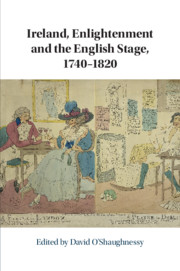Book contents
- Ireland, Enlightenment and the English Stage, 1740–1820
- Ireland, Enlightenment and the English Stage, 1740–1820
- Copyright page
- Contents
- Illustrations
- Tables
- Contributors
- Acknowledgements
- Introduction Staging an Irish Enlightenment
- Part I Representations and Resistance
- Part II Symbiotic Stages: Dublin and London
- Part III Enlightened Perspectives
- Chapter 7 Civility, Patriotism and Performance: Cato and the Irish History Play
- Chapter 8 From Ireland to Peru: Arthur Murphy’s (Anti)-Imperial Dramaturgy
- Chapter 9 The Provincial Commencement of James Field Stanfield
- Chapter 10 Worlding the Village: John O’Keeffe’s ‘Excentric’ Pastorals
- Select Bibliography
- Index
Chapter 10 - Worlding the Village: John O’Keeffe’s ‘Excentric’ Pastorals
from Part III - Enlightened Perspectives
Published online by Cambridge University Press: 22 July 2019
- Ireland, Enlightenment and the English Stage, 1740–1820
- Ireland, Enlightenment and the English Stage, 1740–1820
- Copyright page
- Contents
- Illustrations
- Tables
- Contributors
- Acknowledgements
- Introduction Staging an Irish Enlightenment
- Part I Representations and Resistance
- Part II Symbiotic Stages: Dublin and London
- Part III Enlightened Perspectives
- Chapter 7 Civility, Patriotism and Performance: Cato and the Irish History Play
- Chapter 8 From Ireland to Peru: Arthur Murphy’s (Anti)-Imperial Dramaturgy
- Chapter 9 The Provincial Commencement of James Field Stanfield
- Chapter 10 Worlding the Village: John O’Keeffe’s ‘Excentric’ Pastorals
- Select Bibliography
- Index
Summary
The most common term used in connection with John O’Keeffe’s plays was ‘eccentric’, a descriptor used by his London critics to convey what they saw as the critical unorthodoxy and improbability of his popular drama. This chapter argues that in his pastoral dramas in particular, this irregularity registers the impact of a vernacular form of cosmopolitanism, the type of global consciousness that emerged in the eighteenth century as displaced populations began to make their way into metropolitan centers, bringing with them their culturally specific stories, loyalties and experiences. In O’Keeffe’s case, this imported body of knowledge came out of the culture of the Irish Catholic dispossessed and, as demonstrated through an analysis of The Shamrock (1783), The Poor Soldier (1783) and The Prisoner at Large (1787), this immigrant playwright used the pastoral genre initially to plead the case of the Irish masses. Arguments for tolerance, liberty and justice, however, become increasingly universalised in O’Keeffe’s later pastoral drama as evidenced by Wild Oats (1791) and The World in a Village (1793). In these two dramas, Burke suggests, the village is a global space, one that dramatises the discontents as well as the possibilities inherent in Enlightenment and modernity.
Keywords
- Type
- Chapter
- Information
- Ireland, Enlightenment and the English Stage, 1740-1820 , pp. 226 - 248Publisher: Cambridge University PressPrint publication year: 2019



